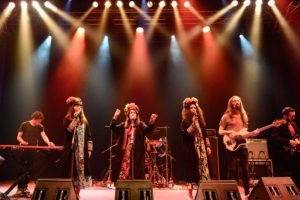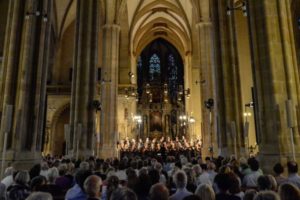“The Jewish symbol of the fig tree in the shade of which there is room for everyone, is our programmatic basis”…. Welcome to the ACHAVA festival…
In 2015, the Hebrew word achava (“friendship” or “brotherhood”) became the name of a new festival in Erfurt, ACHAVA-Festspiele Thüringen. The name reflects the agenda: ACHAVA aims to convey concepts of understanding, tolerance and mutual respect to the general public. From August 31 until September 10, 2017, the festival – in its third year – will not only enrich the cultural landscape in Thuringia, but also set standards for interreligious dialogue. “The Jewish symbol of the fig tree, in the shade of which there is room for everyone, is our programmatic basis. As one of the oldest world religions Judaism has, so to speak, great experience in analyzing man’s weaknesses and strengths,” says event organizer Martin Kranz. In the past, he has succeeded in bringing renowned Israeli musicians like Avishai Cohen, Ravid Kahalani, and Idan Raichel to Erfurt to perform at the festival. However, the ten days program is much more than an opportunity to promote artistic quality outside off the world’s large concert halls. “We are committed to engage in dialogue and debate, to accept dissent and to encounter each other with respect and attention,” explains artistic director Jascha Nemtsov.

Winners of ACHAVA Jazz Award: Fractal Limit (c) by Sarah Hadley
The broad spectrum of topics and events is also reflected both by the festival’s venues and supporters. The crowds gather in churches, synagogues, public spaces, including a former heating plant, or in the open air. Among the many festival supporters are the Thuringian State government, regional businesses and media, as well as the Erfurt municipality, the Israeli Embassy in Berlin, and the Central Council of Jews in Germany to name but a few. Addressing and integrating more and more different social groups, including the Muslim community, churches, teachers, and organisations from the adult education sector, the festival helps foster a sense of cohesion and community beyond religious and political boundaries and lives up to its name.
Insight into Jewish culture
The main focus was and is to provide insight into Jewish and Israeli culture at large. ACHAVA Festival takes the opportunity to mark the European Day of Jewish Culture, a continent-wide Jewish culture and education festival that encompasses hundreds of events in more than 30 countries. In Erfurt, the day provides both a platform to combat indifference and prejudice as well as lots of fun and entertainment in a picturesque medieval setting.
Indeed, last year’s festival could already double the number of visitors compared to the first ACHAVA Festival in 2015 – a challenge this year’s program is glad to take on with a wide variety of concerts, dance performances, panel discussions, exhibitions, a street festival, children’s activities, films, and religious services.
The name “MoZuluArt” is already intriguing – and the festival’s opening concert of this Austrian-African band is bound to be electrifying with its synthesis of 18th century European music and traditional rhythms from Zimbabwe. The “Gypsy Soul and Jewish Heart” concert will also testify to a musical symbiosis of a special kind, whilst the Tatar Monks choir from Kazan introduces sacred music of the Christian Orthodox tradition. Jazz connoisseurs have the Erfurt festival firmly on their agenda already, but this year is special as the First ACHAVA Jazz Award will be presented. It goes to the duo “Fractal Limit”. Brazilian singer Tatiana Parra and pianist Vardan Ovsepian from Armenia quite simply convinced the jury with their music’s “magic and depth”. Of course, they will grace the award ceremony on September 9 with a performance – their first in Germany! “New projects like the ACHAVA Jazz Award open doors for further intercultural exchange,” says Kranz. Another jazz highlight will take place the following evening when Omer Klein and his trio will perform at the Heizwerk, the former heating plant and now one of the hottest venues in town. Klein and his band will introduce the audience to Israel’s lively jazz scene.
Examining the Reformation

The fabolous three sisters of A-Wa-Yemen-Tel Aviv performing in Erfurt
(c) by Stefan Kranz
The exhibition “Music. Resistance. Extermination” at the Erfurt memorial site Topf & Söhne will be dedicated to the Theresienstadt musicians who performed Verdi’s “Requiem” a number of times in the ghetto. The exhibition also traces the fate of Jewish musicians in the town of Weimar. The Staatskapelle Weimar and the MDR broadcast choir will dedicate their performance of the “Requiem” at St. Marien, Erfurt’s cathedral, to the memory of the murdered musicians. A concert and discussion entitled “The Violin of Buchenwald” explores the dramatic story of a unique collection of instruments and the fate of their owners.
As 2017 also marks the 500th anniversary of the beginning of the Reformation in Germany, the “Erfurt Colloquies”, three panel discussions during the festival, will examine and evaluate the contemporary relevance of reformer Martin Luther. “Religious Freedom and the Secular State”, “Freedom and the Rule of Law” are topics which will certainly draw large audiences. “Luckily, people want to make up their own minds and take time to do so,“ says Kranz.
Poet Heinrich Heine once said that the book is the Jews’ “portable homeland”. Israeli artist Nechama Levendel offers a fascinating new interpretation of this dictum. She collects discarded books from different civilisations, languages, and subjects, tears them apart and reassembles them. In this new synthesis she expresses her desire to act as a mediator between different cultures. The festival dedicates a special exhibition to Levendel’s very own art of the book.
Martin Kranz knows that the festival is at the right place and comes at the right time: “Thuringia is an excellent basis. Luckily, a number of gems of Jewish cultural history have been preserved here, especially in Erfurt. This is also why the concept of the ACHAVA Festival contributes to the city’s current application for UNESCO World Heritage status. And, people from all over Germany come to our festival.”

Erfurt Cathedral, one of the festival’s venues
(c) by Stefan Kranz
And Kranz is not the only one with this conviction: “Our first and foremost partner was the state of Thuringia, in the person of Prime Minister Bodo Ramelow. He immediately recognized the potential and current relevance and has supported the project with great enthusiasm and cooperativeness. Reinhard Schramm as president of the Jewish Community of Thuringia has also been with us from the beginning and every year helps to mobilize members and partners. In addition, we have programmatic partners such as all political foundations in Germany and, of course, corporations and individuals acting as sponsors.”
What does the future hold for the festival? “Of course I wish ACHAVA Festival mazal tov till 120 … but I know it’s no good resting on one’s laurels. Thus, I am looking forward to lots of constructive feedback so that we can ensure future ACHAVA festivals will be lively, up-to-date, and interesting. A festival for the people can only be done with the people.”
Professor Reinhard Schramm adds: “The ACHAVA Festival enriches everyday life in our Jewish community and in society at large with Jewish culture at its best. We are involved in the preparation and the conduct of Shabbat services and of cultural and political events. The festival is complemented by the Jewish-Israeli Cultural Days and the program of the Yiddish Summer Weimar, as well as our own cultural activities. Together with government commitment for preserving Jewish heritage, this generates a sense of Jewish normality in Thuringia.” Is there any better way to promote achava – friendship and brotherhood?
ACHAVA Festival starts on
August 31, 2017.
www.achava-festspiele.de
